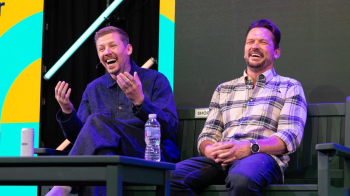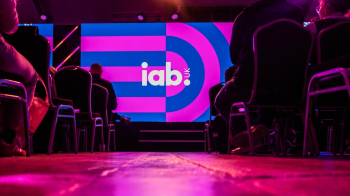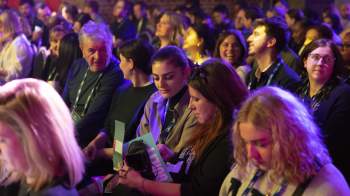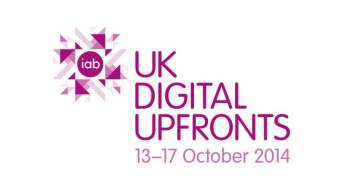DigitasLBi kicks off the 2017 Upfronts by asking if we can make the Internet great again
DigitasLBi kicked off this year’s IAB UK Digital Upfronts event on Friday 29 September by hosting a fast-paced afternoon of provocative debate, focused on whether we can make the Internet ‘great’ again.
Jamie Bartlett, author and director of the Centre for the Analysis of Social Media at Demos kicked off proceedings by saying that, in the ‘90s, we thought the Internet would make us ‘kinder, smarter, wiser’. However, ‘weird and difficult’ sub cultures have emerged, he said, predicting that the web will become even more ‘difficult to control’.
“More direct democracy in politics is almost inevitable,” he added.
“There are going to be all sorts of strange moral questions we have to answer,” he went on, pointing out that, in his view, pressure from advertisers will become extremely important in our battle to ensure a healthy digital world.
Next up, Mei Lin Fung, Co-Founder of People-Centered Internet and one of the original founders of CRM, told the audience that the future needs to be informed by the past. And, with the Internet set to grow massively ‘from the size of a beachball to the size of the sun’, she warned that, as an industry, we have to ‘think new’.
“We need an all hands on deck response - not just government, not just industry, not just people helping their families, but people all coming together,” she said. “Communities have always been the way humans have survived.”
Likewise, for brands to survive too, she said that trust is key. “Increasing trust is better than reducing costs by ten per cent,” she claimed, warning that it is now ‘critical’ that brands build loyalty through CSR initiatives.
Daniel Franklin, executive editor of The Economist, then treated the audience to his take on the year ahead – a year which will witness the US mid-term elections, the World Cup in Russia, follow up to the Paris agreement and the start of 5G trials and tourist travels in space, amongst many, many other things.
In the midst of all this, we are still complaining about the ‘filter bubble’, added Sameer Modha, DigitasLBi’s head of data propositions in the UK.
On stage with Maureen Traynor, global director, creative solutions at Spotify, Modha pointed out that” The Guardian, The Mail, Now That’s What I call Music are all filter bubbles.”
“Yet we want the platforms to be more neutral … It’s up to people to choose,” he said, describing algorithms as ‘enthusiastic puppies … bringing things back for you’.
Spotify’s Traynor said that the music streaming platform learnt early on that its audience was looking for curation and personalisation to help it navigate endless choice. Gleaning audience insights is an ongoing work in progress, she said, as Spotify tries to extrapolate what music consumption patterns mean for purchase behaviour.
Next, Richard Wilson, Co-Founder of the Stop Funding Hate campaign, said that the drive to boost audience reach at any cost has fuelled a global surge in ‘hate media’ and fake news. But, on a more positive note, he declared that advertisers have the power to fix the business model and make the Internet great again.
Katy Woodrow Hill, head of strategy at Livity, also pointed to our responsibility to young people today, whom she said are faced with ‘limitless opportunity but full of anxiety’.
“They are hyper connected, but can feel more isolated,” she said. “As brands, as marketers we have massive responsibility.”
Mark Adams, SVP at Vice agreed and spoke of brands ‘doing the Dad dance’ because they haven’t listened, nor understood, their audiences.
“The more you build social and cultural impact into something that’s where you get long term business impact that you’re not paying for,” added Woodrow Hill.
Finally, the outspoken journalist, author and broadcaster, Grace Dent pointed out that the internet has always been ‘murky’ but admitted: “I’m on there from the moment I wake up … There is joy there. A Father opening their present…someone hitting their target… people getting in touch with you that you haven’t seen for years - and that you are really pleased to hear from.
“The majority of us aren’t on there every day because we want to be furious and angry.”
And on a lighter note, she joked: “Of course it’s also made narcissim absolutely acceptable. In the ‘90s if anyone had caught you taken you taking a photo of yourself you would have never lived it down.”
Related content
Mood, mindset and meaning: how audio and culture shaped day two of IAB Upfronts
Learn moreFrom WhatsApp to fandom: How connection and creativity ruled IAB Upfronts day one
Learn moreNectar360, Bauer, Tripadvisor, Global, Meta & Spotify at IAB UK’s first Media Upfronts
Learn moreIAB UK launches the UK Digital Upfronts
Learn more
Fast forward to 2030 with Futurescape
An in-depth exploration of the attitudes, innovations and media shifts that will shape the years ahead and redefine how we advertise by the turn of the decade



